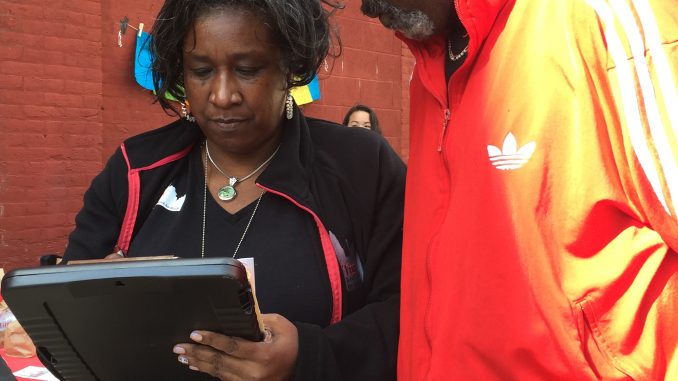

Mariana Pardes’ two worlds—academic research and direct social service—became one when she joined the Temple Health: Block-by-Block initiative as a researcher.
“I think it’s rare to be involved in applied research and to have both the community engagement and the real possibility that it’s going to change people’s lives in some direct and immediate way,” Pardes said. “So it combines both those worlds for me.”
Pardes serves as a field research specialist for the Temple Clinical Research Institute, alongside a team of three other researchers who have been canvassing the streets of North Philadelphia since August to ask residents about their health statuses and concerns.
Dr. Susan Fisher, the initiative’s principal investigator, started a similar program at the University of Rochester but brought the project to Temple after noticing similarities between the communities surrounding the universities.
“The idea in Rochester and here was, describe the health of the community, identify gaps in care to the community and also inform the community about the resources at the hospital,” Fisher said.
The Block-by-Block initiative also focuses on informing residents about clinical research opportunities, Fisher said, so that they can participate in studies, and in return Temple can work to provide care for their demonstrated health needs.
Amie Devlin, research program manager, said that researchers targeted 11 zip codes in Strawberry Mansion, North Philly, Germantown and Kensington, asking residents older than 18 about their health, doctor visits and interest in health resources.
The participants will be contacted every six months with follow up questions, so researchers can see any trends in the target population over time, Devlin said.
“If we can find ‘X’ number of people that have asthma, that shows that there’s a need for an asthma clinic in the neighborhood,” she added.
There is no specific research question that has been posed at this point.
“We also want to be able to have a big pool of data that people can, if they want to investigate some research, they can make a case for it,” Devlin said.
Fisher said the gathered data will be available to researchers at Temple and eventually any researchers in Philadelphia.
Besides tracking data, researchers want to identify any specific healthcare issues participants may be dealing with and provide them with resources.
“If they say that they’ve been prescribed medicine and they’re not taking it, we ask them the reasons why they stopped taking it,” Devlin said. “So if it’s cost or it’s confusing, we can look at that and maybe make refill instructions easier and just see what kind of needs that are out there.”
To find out these needs, researchers have been reaching out to community members by setting up informational tables at community events like the Haunted Playground Halloween event recently held at Hartranft Community Center.
Anthony Jackson, a volunteer organizer at the center, has been coordinating events with Block-by-Block and the community. He said community members have been receptive to the research team.
“They’re very receptive, even with the interviews that the Block-by-Block program members do,” Jackson said. “As soon as one person’s done, there’s another waiting to sign up or find out a little bit more information.”
Jackson said it is important the research team goes to community members, instead of having the community members come to Temple’s hospital or campus.
“The resources are being brought to them, so it makes it a lot easier,” Jackson said.
Pardes said the university’s presence off-campus is essential to this project.
“Everybody knows Temple’s right around the corner, but how many people really come out of the hospital and talk to them face-to-face and really see them, really get to know them?” Pardes said. “I think what’s special is we’re meeting people on their terms, in their neighborhoods, in front of their homes, hopefully in their living rooms.”
Jenny Roberts can be reached at jennifer.roberts@temple.edu or on Twitter @jennyroberts511.



Be the first to comment